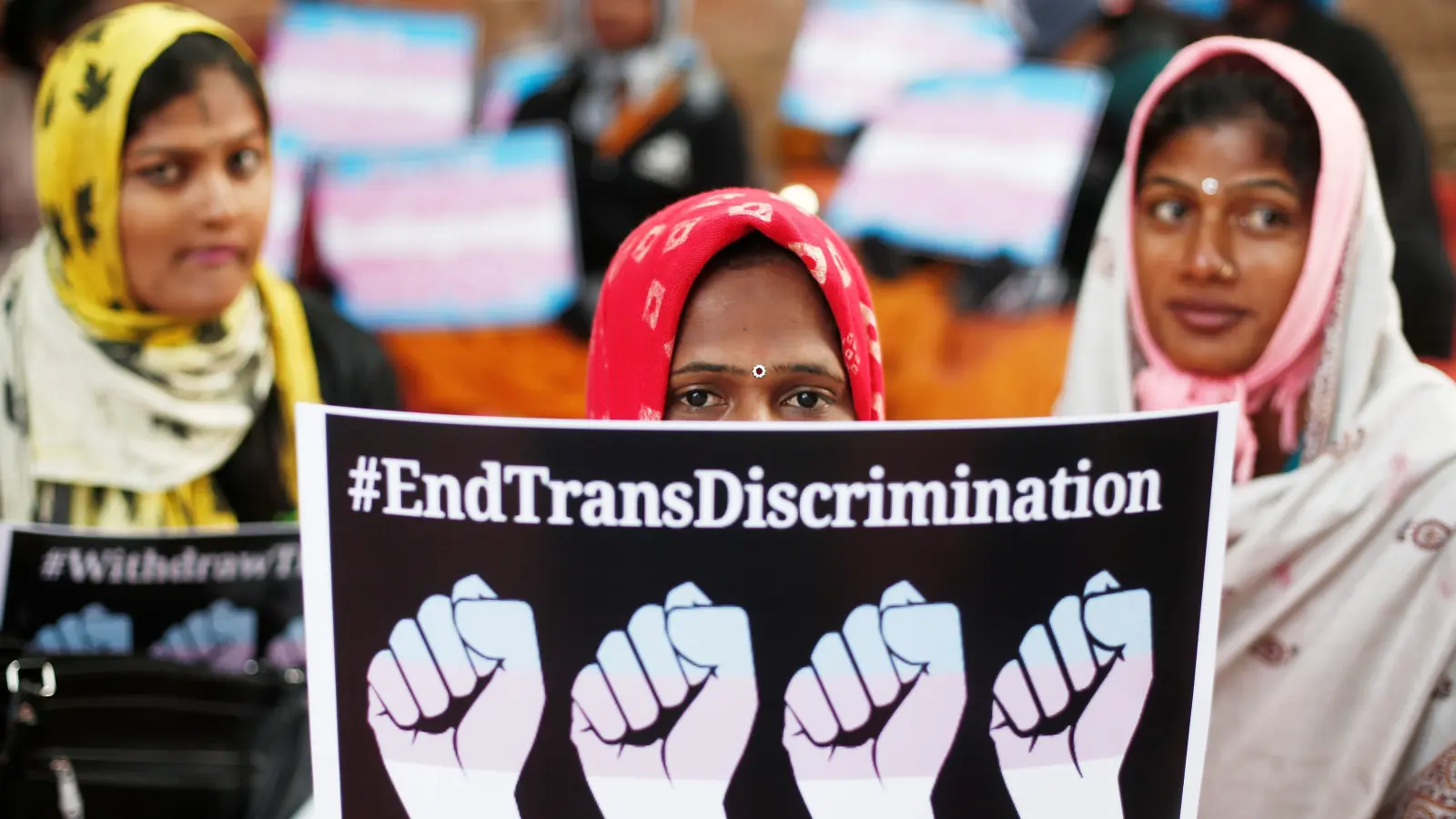Editor’s Note: FII’s #MoodOfTheMonth for May, 2022 is Gender at Workplaces. We invite submissions on the many layers of this theme throughout the month. If you’d like to contribute, kindly refer to our submission guidelines and email your articles to sukanya@feminisminindia.com
Diversity has become the selling point for most organisational cultures across the world. As the workplace becomes an important platform to ensure dignity, acceptance of one’s identity is desirable. The campaigns for better and safer workspaces for women, disabled individuals, racial, gender and sexual minorities stem from this need. Unfortunately, many such promises only pay lip service to the principle of equality, thus transferring the onus on to the members of the disadvantaged communities to struggle for their rights. The transgender community’s struggle for an inclusive workspace is a striking example of this.
To begin with, gender identity, social and institutional stigma make it difficult to access many employment spaces for trans individuals. In a society that is adamant on creating a glass ceiling for cis-gender women, the challenges of the transgender community get further exacerbated. The National Human Rights Commission in its first ever study on transgender population revealed that access to any form of economic activity is denied to 92 per cent transgenders, even the ones qualified to get jobs.
But what even the most progressive companies that do not discriminate in recruitment fail to understand is that ensuring trans people get an employment is only the first step towards inclusivity. Our offices are constructed in a cisnormative manner by default and it is only by actively checking those biases, that we can ensure a safe and comfortable working space for the trans community.
This calls for the need to come up with better human resource training for all selected personnel. Allyship might be a choice but being respectful of all identities should be mandatory. This can begin by being mindful of everyone’s pronouns instead of assuming them. Sensitivity training is important when one approaches issues of gender identity and expression in the workspace. Innovative methods like using pins with pronouns have been suggested to prevent misgendering
This trend is illustrated by the experiences with Kerala’s Kochi Metro Rail Limited. The project that employed 23 transgender persons, saw eight of them quitting as they were not able to find landlords willing to give them accommodation. When occupational opportunities come with these in-built hurdles, merely non-discrimination in the selection process is not sufficient to ensure inclusivity for transgender, genderfluid and genderqueeer individuals.
Reyna*,who works in the risk analysis and counter-terrorism sector says that the infrastructural deficits in the workspace adds on to work-related stress. Emphasising on the importance of having gender-neutral washrooms, she added, “Since I express my gender as a transgender, me using ladies toilet is an issue for other women in office as well.” The transgender persons also have the burden of passing off as cis-gender counterparts to get validation for their identity from their colleagues.
For Reyna, who has not been able to afford HRT or laser treatment, this translates to wasting precious time to pass off as a cis-gender woman. She says, “Each morning I have to spend 2-3 hours just to put on makeup and get ready so that I can easily pass off. Not passing off comes with fear for my safety from taunts and verbal hurt.”
This calls for the need to come up with better human resource training for all selected personnel. Allyship might be a choice but being respectful of all identities should be mandatory. This can begin by being mindful of everyone’s pronouns instead of assuming them. Sensitivity training is important when one approaches issues of gender identity and expression in the workspace. Innovative methods like using pins with pronouns have been suggested to prevent misgendering.
Also read: Colonisation And Transphobia: The History Of The Binary Construct Of Gender In India

Deadnaming a transgender individual (the act of referring to a transgender or non-binary person by a name they used prior to transitioning, such as their birth name) can cause a great deal of discomfort. Reyna remarked that having to sign in everyday using her deadname in the office came with heightened dysphoria and hopelessness. This brings us to the reality of bureaucratic red tapism that prevents individuals from changing their identifying documents to their actual names in a time sensitive manner.
The Indian Express reported that in 2016, a Kolkata based transman who underwent gender confirmation surgery had to spend nearly five months getting his papers in order. In a statement given to the newspaper, he opined, “The process was long and tedious. And it cost me Rs 2.5 lakh, which is why I believe all organisations, including banking and financial institutions, need greater sensitisation and extend such cover for all employees irrespective of their gender and expression.”
India’s first corporate fellowship programme for Transgender Youth by Pernod Ricard India, in collaboration with Tata Institute of Social Sciences, was launched only as recently as May 6, 2022. With the latest Trans bill posing more hurdles to the transgender community, we cannot afford for the positive changes to be limited to large transnational corporations with recruitment practices that make it difficult for persons without heavy structural privilege to gain access to
In recent years, corporations have started expanding their employee benefits programme to be more accommodative. Godrej’s launch of A Manifesto For Trans Inclusion In The Indian Workplace, VLCC’s free “Assistant Beauty Therapist” training course for transgender individuals and Diageo India’s enhanced wellness policy are all steps in the right direction.
While many companies have such LGBTQIA+ friendly policies in place, their implementation reports or effectiveness is not so clear. Trans activist and UNDP consultant Zainab Patel puts the presence of trans individuals in Indian corporate space at around 300. The coverage of medical insurance available at workplace extending to gender confirmation and sex reassignmet treatment procedures is one step towards normalising the needs of the transgender population.
With increased representation of the community in popular media and culture, the need for inclusion of trans realities have dawned upon many organisations, but are slow to catch up. Kiran*, who is employed as a content writer says, “It’s fictional content, but the thread of heteronormativity runs through the prompts, storylines and manuscripts that I have to work with. Sometimes, I wish to work with materials that I can relate to as well. The companies giving so much prominence to heteronormative content often seems like a passive form of queer erasure.”

India’s first corporate fellowship programme for Transgender Youth by Pernod Ricard India, in collaboration with Tata Institute of Social Sciences, was launched only as recently as May 6, 2022. With the latest Trans bill posing more hurdles to the transgender community, we cannot afford for the positive changes to be limited to large transnational corporations with recruitment practices that make it difficult for persons without heavy structural privilege to gain access to.
It is important for workplaces to go beyond having a random clause on their official policy or conducting panels. Organisations should have proactive approaches that seek to find all the inherent cisnormative practices in the workspace through open communication with people who identify as transgender, gender non-conforming, genderfluid, genderqueer etc. The lack of preparedness cannot be an excuse to deny the transgender community of their rights in the workspace any longer.
Also read: Manipur Inaugurated Its First Transgender Women’s Grievance Cell
*Names changed upon request of the respective individuals to protect privacy
Featured Image Source: Quartz
About the author(s)
Stephy is a masters student in Jamia. Her interests revolve around issues of conflict and peace, gender and mental health. She hopes to shed her inherent biases daily and become a better ally each day




